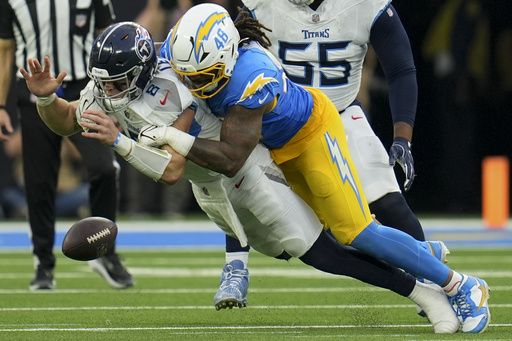
INGLEWOOD, Calif. — During a pivotal moment in the game against the Los Angeles Chargers, the Tennessee Titans found themselves on the verge of a significant momentum shift when Jeffery Simmons struck Chargers quarterback Justin Herbert’s arm. This led to the ball landing in the hands of Roger McCreary, seemingly setting up a defensive touchdown just before halftime. However, after reviewing the play, officials ruled it an incomplete pass instead, costing the Titans what could have been a critical score in their 27-17 defeat.
Calvin Ridley, a wide receiver for the Titans, expressed disbelief at the ruling, asserting that it appeared to be a clear fumble to him and many others watching. He lamented how such decisions can disrupt the flow of a game and impact its overall outcome. With a potential lead of 14-13 in sight, the Titans felt let down as Herbert was determined to have maintained control of the ball when he threw it forward.
Mark Butterworth, the NFL’s vice president of instant replay, explained that the decision was based on the evidence of Herbert’s arm moving in a forward motion while holding the ball. He clarified that this resulted in the overturning of the original call of a fumble.
Brian Callahan, in his first season as head coach of the Titans, was visibly frustrated on the sidelines when informed of the reversal. After the match, he refrained from criticizing the call directly but shared his surprise and confusion about the process. “I thought it was going to stand on the field,” he commented, indicating that he was initially led to believe the call would not be changed.
Herbert himself admitted uncertainty about the ruling but expressed gratitude for the final decision, knowing it played an essential role in the game’s turning point. Both teams recognized that the reversal was significant — had the play scored, it could have provided Tennessee with an opportunity to take the lead, relying on their effective running game that averaged 6.3 yards per carry. Being able to play with a lead might have forced the Chargers (6-3) to adjust their offensive strategy.
Callahan noted that the controversial call was a huge swing in momentum, a sentiment echoed by Herbert, who acknowledged its importance going into the halftime break. The Titans began the third quarter with a promising drive that reached the Chargers’ 8-yard line, but Will Levis was unable to convert a crucial pass on third down, leading to a field goal that narrowed the gap to 13-10.
Unfortunately for Tennessee, they surrendered a lengthy kickoff return that set the Chargers up for yet another touchdown, pushing the Titans further behind at 20-10. Levis struggled under pressure, taking two costly sacks, which contributed to a challenging offensive situation. The Chargers then executed a commanding 95-yard drive that sealed the game at 27-10 in the fourth quarter.
Reflecting on the game, McCreary attributed the second-half difficulties to a general lack of focus, noting the team’s inability to finish strong despite starting out well. He emphasized the need for mutual support among team members, particularly when one side struggles.
This frustrating loss was particularly challenging for the Titans considering they managed to keep the ball secure throughout the contest. Levis, who returned as a starter after dealing with a shoulder injury for three games, completed 18 of 23 passes for 175 yards and threw two touchdown passes to Ridley while avoiding any turnovers, although he was sacked seven times.
“I thought Will was good at times,” Callahan stated, recognizing both the highs and lows of Levis’s performance and reflecting on aspects of his game that could be improved for the future. “There are definitely some things that are encouraging and things to teach off of.”
